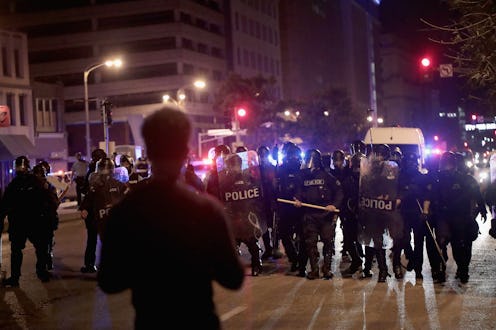News
St. Louis Police Chanted "Whose Streets? Our Streets" As They Arrested Protestors — VIDEO

Another day of protests rocked St. Louis on Sunday. Responding to the acquittal of white police officer Jason Stockley, who had faced charges of murdering a black motorist, protesters first took to the streets on Friday, with demonstrations lasting throughout the weekend. The police arrested more than 80 people on Sunday night, but reports have emerged that they were unable to leave the scene after the police surrounded them. Another troubling development is that several St. Louis officers chanted "Whose streets? Our streets" while arresting protestors, employing a rally cry often used by Black Lives Matter.
According to photojournalist David Carson, the commander at the scene stated he had not heard the officers chanting "Whose streets? Our streets," but labeled such behavior unacceptable. Carson reported the commander said he would "deal with it." A video showing St. Louis police officers purportedly chanting "Whose streets? Our streets" has been circulating on Twitter, and multiple media outlets independently reported that scene.
Schron Jackson from the Public Information Division of the St. Louis Metropolitan Police responded to Bustle's request for comment: "The Department is aware of the video circulating on social media, and is reviewing the footage. We hold our officers to the highest standards of professionalism and any officer not meeting those standards will be held accountable."
Details of how the police have responded to the St. Louis protests raise many questions. Mike Faulk, a reported for the St. Louis Post-Dispatch, conveyed via Twitter that the police had blocked in a small group of protesters late Sunday despite a photo of his arrest showing Faulk wearing something that looks like a press badge.
Faulk's account of his experience paints a bleak picture with troubling implications for what protections are afforded protesters. According to Faulk, a human blockade of police officers made leaving impossible, which meant none of the protesters trapped inside could follow the order to disperse. As a result, nearly 100 found themselves arrested, a process which for Faulk included being shoved to the ground, having his head pushed into the concrete by a police officer's boot, and getting hit with pepper spray after already being fully constrained.
Protesters in St. Louis were prompted to march the wake of a judge's decision to let former officer Stockley walk free. In 2011, he shot and killed Anthony Lamar Smith, a 24-year-old black man arrested for allegedly being involved in a drug deal. Prosecutors in the trial allege that the gun found on Smith was planted by Stockley, as his was the only DNA found on the weapon. They also submitted evidence from a police cam with Stockely recorded as saying he was going to "kill this (expletive)."
However, several legal experts were not surprised by the verdict, given Stockley was charged with first-degree murder. The seriousness of that level of crime demands a high burden of proof. Many familiar with the laws involved did not expect Stockley to be found guilty.
The St. Louis protests have been largely peaceful by day, but at night there have been several reported cases of windows broken and private property vandalized. Mayor of St. Louis Lyda Krewson said, "The vast majority of protesters are nonviolent but for the third day in a row the days have been calm and the nights have been destructive." Police are charged with keeping the peace, and that obviously entails ensuring that protesters who engage in violent behavior are arrested and charged accordingly.
However, Faulk's account of what happened late Sunday night does not immediately seem to align with that goal. And Faulk's version of events has been backed up by others present at the scene. The Twitter account of Rebelutionary Z, a self-described citizen journalist known for live streaming events, reported similar details to Faulk's account.
According to those on the ground, protesters have no intention of leaving any time soon. "They seem to have come to this very organized with lessons learned from the Ferguson protests," says Nancy Fowler from St. Louis Public Radio. Demonstrations are expected to continue for several days more, if not weeks.